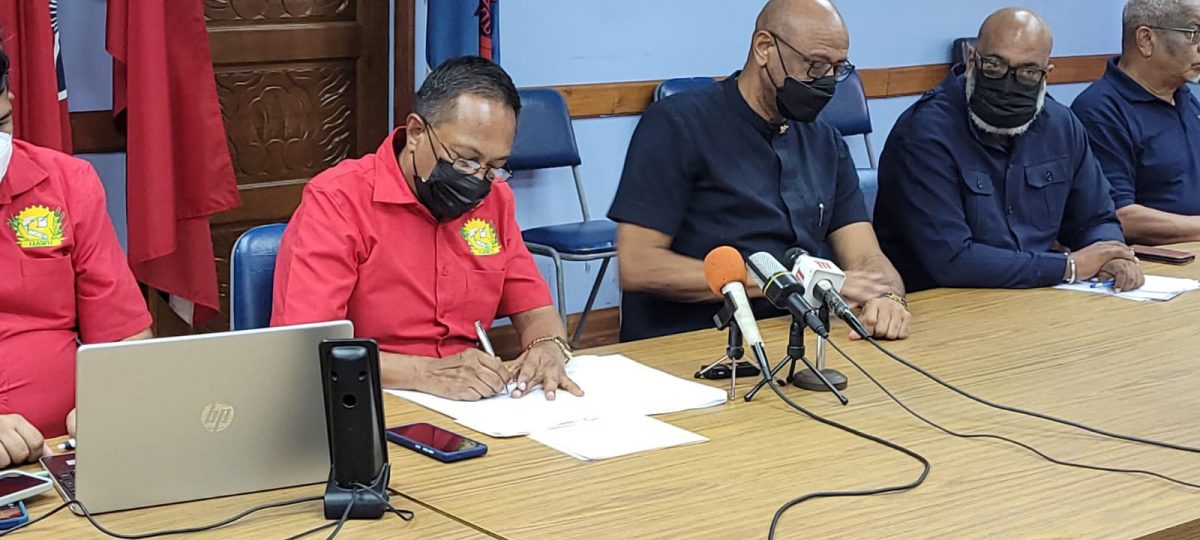As it works towards becoming the official bargaining agent for workers in the burgeoning oil and gas sector here, the Guyana Agricultural and General Workers Union (GAWU) yesterday signed a Memorandum of Co-operation (MoC) with its sister union, Trinidad-based Oilfield Workers’ Trade Union (OWTU).
The signing of the agreement according to GAWU president, Seepaul Narine, presents the opportunity for the union to gain significant expertise from the OWTU which has been working in the industry for over 85 years.
“The signing of this memorandum is going to allow us to deepen our relations, and at the same time provide further and a much needed guidance to our union which will redound to the benefit of the world. And as a union over the years we have a long history of standing up and defending and this is just another step,” Narine remarked at a press briefing following the signing of the agreement.
Narine and OWTU President General, Ancel Roget, yesterday signed the agreement after days of discussion in Trinidad and Tobago. The signing took place at the OWTU’s Paramount Building headquarters, San Fernando on Tuesday.
GAWU, which has long been known as a representative for sugar workers, made a decision a year ago to establish an oil and gas branch to aid in championing the workers’ rights in the industry. Though not yet recognised as a bargaining agent, the union has been working with the Ministry of Labour to address the issues plaguing the sector.
“In resolving issues of workers, one cannot depend on any Ministry of Labour whether the government is friendly to the contractor or not… It is only unionisation that will be able to take workers out of their difficulties,” Narine posited, while noting that on most occasions they have to wait on the Labour Ministry to intervene and apply pressure before a resolution can be achieved.
According to Narine, this collaboration is illustrative of GAWU’s seriousness in representing workers and ensuring workers’ welfare is given high priority.
Narine in his address highlighted that OWTU will offer guidance on matters relating to occupational safety and health as well as guidance in some technical aspects which GAWU is not yet equipped to handle.
Roget in his remarks said that with their experience representing workers in Trinidad and Tobago, he believes OWTU can be an asset to GAWU.
He stated that their diligent fight for decent working conditions in the twin-island’s oil and gas sector has set a precedent as to what should be followed not just in their country, but others.
The President General explained that with their experience they will be able to properly bargain for the fair treatment of workers and apply pressure for workers’ rights to be all times respected by employers.
“It stands to reason that with the recent development of the oil and gas sector in Guyana that they would turn to their brother union for advice, support, direction and training and development assistance on how to best have their workers, the people in Guyana, benefit from the resources of the land.”
He emphasised that because of their active representation for workers in the sector, T&T has established a standard of working conditions that is acceptable to workers.
GAWU will also be using the union’s knowledge to learn to navigate discussions with third-party employers. This has been a major challenge for the union as the employers have not been open to discussion with the union.
While workers have been welcoming of the idea of being unionised, the union said there have been some challenges from employers as they have not been welcoming to union representatives.
“A challenge is how do you bargain for someone who was hired by a third party? Traditionally it has been employee and employer but now there is the recruitment agency who supplies the workers to the company so we have to flesh out how we deal with that,” General Secretary of the Union Aslim Singh explained.
Singh also pointed out that employees are afraid in some cases to make their working conditions public as they are often victimised and intimidated by superiors.
The union had stated that third-party recruitment agencies have been contributing to exploitative workplace practices.
From a review of documents shared with the union, GAWU has recognised that not many workers were employed by the enterprise for whom they were undertaking their tasks.
“Many workers are employed by agents who assign workers to work at one company or another. We have seen in some instances, workers from various agents working at different companies. Alarmingly, each agent apparently has their own benefits and conditions-of-employment. Thus, workers who are undertaking the exact job in a particular company can have a completely different range of benefits. This on the surface appears discriminatory as workers undertaking the same job should lawfully receive equal benefits and reward,” the union said in a statement to the press earlier this year.
The union had opined that the practice of agent employment is an attempt to control workers’ attitudes and have them “hanging by a string” possibly with the aim of making them subservient.
“Such relations enable firms to remove employees without rhyme or reason and without any legal link to their enterprise. Such actions may be an attempt to send a clear message to workers should they wish to speak up and engender, possibly, docility among workers. The fragmentation of the workforce undoubtedly promotes greater division among the workers seemingly to perpetuate exploitative policies. It also constrains workers from becoming organised and being able to secure gains from their coming together.”









